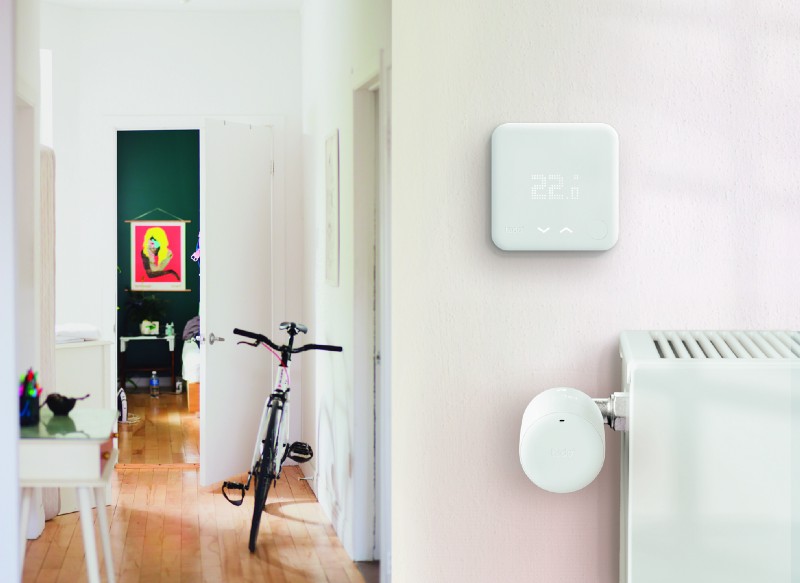Tado, a German startup that makes smart thermostats, is helping energy companies offer new kinds of digital services to their customers.
The startup’s smart thermostat has been engineered to be able to connect to a heating system’s digital serial interface. Through Tado, utilities can monitor the health of a house’s boiler remotely and collect diagnostics that can be used by engineers or repairmen.
And Tado, a competitor to Nest, a smart thermostat company acquired by Google in 2014 for $3.2 billion, has ambitious plans to do more with utilities.
The company — which has just raised a new $50 million round of financing from Amazon, the French energy company Total, the UK energy company E.ON, EIC and the European Investment Bank — has so far struck partnership deals with 30 energy companies.

Examples of Tado’s utility customers include :
E.ON (UK, Germany and Italy)
SSE (UK)
Naturgy (Spain)
Essent (Belgium)
OVO Energy (UK)
Badenova (Germany)
Vattenfall (Germany)
Nuon (Netherlands)
Energie Oberösterreich (Austria)
IREN Mercato (Italy)
The deals are helping utilities increase customer retention, says Tado’s co-founder and managing director, Christian Deilmann.
The deregulation of the energy sector in Europe is leading to high customer churn. “With much more competition coming onto the market people really start to switch providers based on price,” he says. “In the UK a quarter of the people switch providers every year. If it is just about buying a cubic meter of gas or some kilowatts of electricity they don’t care where there energy is coming from.”
Tado helps utilities offer a more holistic service and build a much stronger customer relationship, says Deilmann.
Under the partnership deals, Tado delivers the maintenance data to the utility company so that it knows when there is a problem in a household and what is broken, and Tado even calculates how much time it might take to repair it. With maintenance contracts that are not based on digital data, some 50% of the time that repairmen show up to fix something they end up having to order a part from a wholesaler and come back a second time. “With Tado the first-time fix rate is 95% because the engineer knows up front what is wrong,” says Deilmann.
The heating system has 120 codes and an error code is transmitted anytime there is a fault somewhere. “If the repairman knows your pump is broken and shows up the first time with a spare part it gives your customer a very good feeling,” he says.
Tado and the energy companies split revenues from the service. “We really want to back this up with more services,” Deilmann says.
It’s a good bet that at least one of the new services will be voice-based and work on Alexa, Amazon’s cloud-based service, which is available on tens of millions of devices.
People who are used to controlling temperature through theirs phone are also likely to want to control by voice, “therefore there is a strong correlation and it is very interesting to them,” Deilmann says. Amazon likes smart-home customers because research shows that the engagement rate goes up by a factor of four when there are daily interactions.
Helping to Balance the Grid
The smart thermostat business is part of a booming sector. Gartner forecasts that consumers and businesses will be spending almost $3 trillion on connected devices such as smart-home hardware by 2020.
Around a third of all global energy consumption goes to the heating and cooling of buildings. Smarter technologies allow more efficient control and can save up to 31% of that energy.
But Tado wants to do more with its smart thermostats than help fix boilers and enable consumers to say “Alexa, turn down the heat in the living room.” It wants to help balance the grid.
Heating or air conditioning systems are the largest consumers of energy in buildings, says Deilmann. “The good thing is that there is some flexibility in the heating and AC systems and this flexibility is of value to the energy grid, especially in areas where you have production in solar and wind.”
A shift of 20% of energy — while keeping to the boundaries of what constitutes a level of comfort in homes — amounts to a lot of energy when you add up all the buildings in the country, says Deilmann. “It is not ideal when you have to think about what time you should load the dishwasher but in our case it is really using flexibility assets in the background without having any effect on the comfort level.”
. “It is a massive market. It has huge potential and we want to grab it.”






